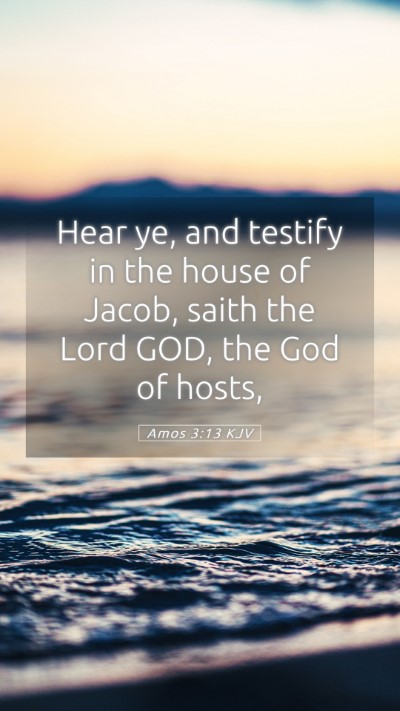Old Testament
Genesis Exodus Leviticus Numbers Deuteronomy Joshua Judges Ruth 1 Samuel 2 Samuel 1 Kings 2 Kings 1 Chronicles 2 Chronicles Ezra Nehemiah Esther Job Psalms Proverbs Ecclesiastes Song of Solomon Isaiah Jeremiah Lamentations Ezekiel Daniel Hosea Joel Amos Obadiah Jonah Micah Nahum Habakkuk Zephaniah Haggai Zechariah MalachiAmos 3:13 Meaning
What is the meaning of Amos 3:13?
Hear ye, and testify in the house of Jacob, saith the Lord GOD, the God of hosts,
Amos 3:13 Bible Verse Meaning
Amos 3:13 Commentary and Interpretation
Bible Verse: "Hear, and testify against the house of Jacob, saith the Lord God, the God of hosts." (Amos 3:13 KJV)
This verse calls for attention and serves as a declaration from God through the prophet Amos, emphasizing the seriousness of His message to Israel—specifically the house of Jacob.
Summary of Meaning
In Amos 3:13, God commands the people to hear His words, indicating a need for them to be receptive to His message. The phrase "testify against the house of Jacob" suggests that God intends to bring forth evidence of Israel's sins and failings. This verse highlights God's sovereign authority as "the God of hosts" and sets the stage for a confrontation regarding the nation's disobedience.
Bible Verse Meanings
- Divine Authority: The reference to "the Lord God" establishes God's supreme authority over Israel and His people.
- Call to Listen: The imperative "hear" serves as a demand for attention to the divine instructions that follow.
- Judgment Context: The testimony against Jacob depicts divine judgment which is rooted in Israel's covenant relationship with God.
Commentary Insights
Matthew Henry: Henry emphasizes the sorrowful state of Israel, noting that their continual disobedience stirred God's righteous anger. He explains that God is pleading with them so they may recognize their wrongdoing and return to Him.
Albert Barnes: Barnes views this verse as a setting for the prosecution against Israel, using "testify" as an indication of legal proceedings. He also connects the term "house of Jacob" to the collective identity of the people, highlighting the consequences of their unfaithfulness.
Adam Clarke: Clarke notes that God's call to "hear" underscores the urgency of His message. He reflects on the historical context in which Israel had strayed from God's commandments, warranting a serious confrontation as expressed through Amos.
Understanding Scripture
This verse, along with the surrounding passages, requires an understanding of the socio-political context of Israel at the time. The prophet Amos was sent during a period of relative prosperity but also of great moral decay. The reminders of God's covenant relationship served to awaken the people to the realities of their spiritual impoverishment.
Significance of the Verse
Amos 3:13 is significant for several reasons:
- It marks a pivotal moment in the prophetic tradition, where God proactively challenges His people to accountability.
- It establishes the importance of hearing God's word and recognizing the implications of silence in the face of divine truth.
- It calls for a deeper engagement with the character of God as both merciful and just, providing a holistic understanding of His dealings with humanity.
Related Bible Verses
- Isaiah 1:18
- Jeremiah 7:13
- Hosea 4:1
- Micah 6:8
- Matthew 11:15
Application of the Verse
In application, believers today are reminded to be attentive listeners to God's call, reflecting on their own lives and actions in light of His truth. The enduring relevance of Amos serves as a challenge to self-examination, encouraging faithfulness in our covenantal relationship with God.
Bible Study Insights
For those engaging in Bible study groups or online Bible study, Amos 3:13 provides a rich topic for discussion on themes of accountability and prophecy. It opens up questions about how modern believers perceive God's call to listen and respond to His directives in their lives.
Conclusion
Understanding Amos 3:13 requires insight into the nature of God's communication with His people. It calls for serious reflection on the nature of divine judgment and the need for personal accountability. As we study this scripture, may we grow in our knowledge of God's ways and deepen our commitment to His will in our own lives.


